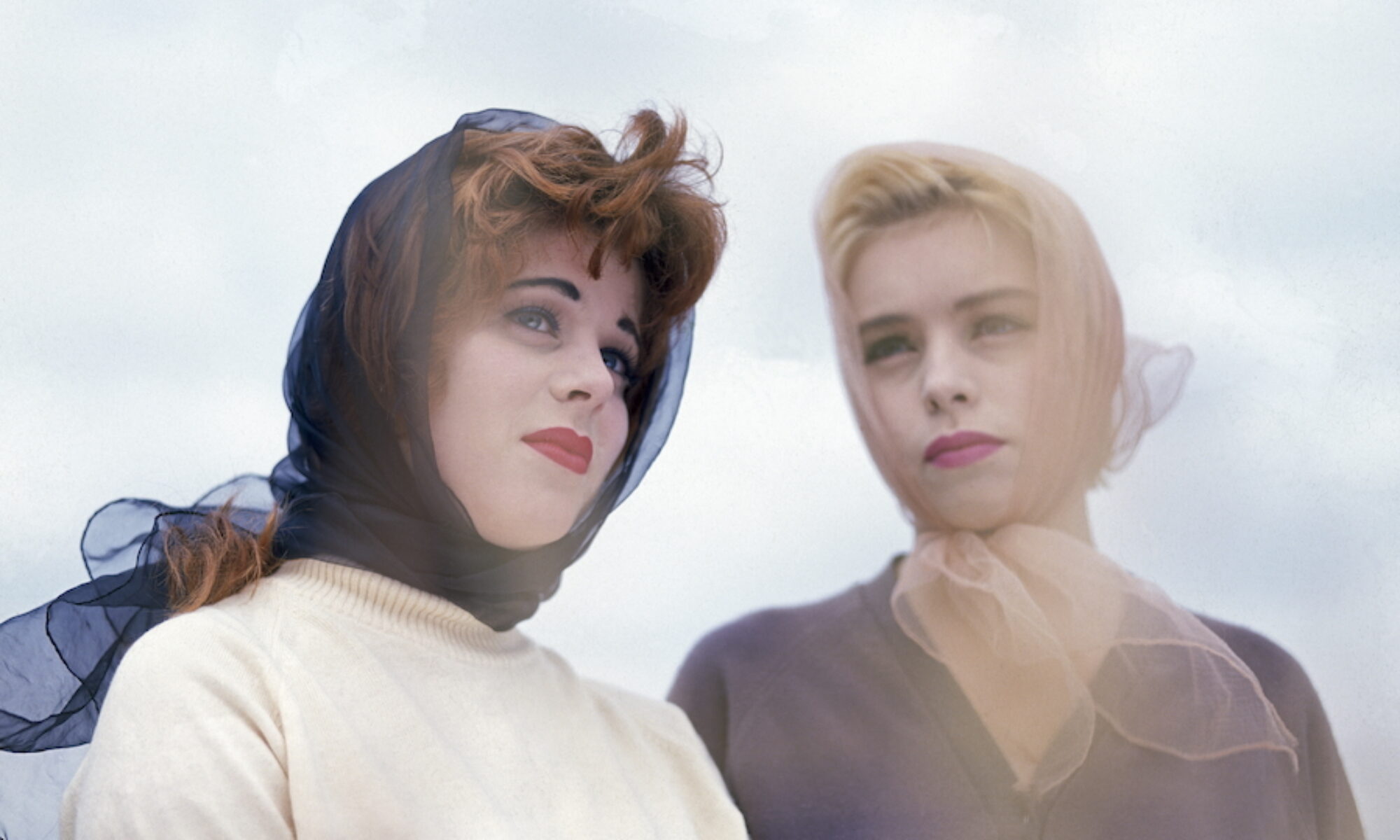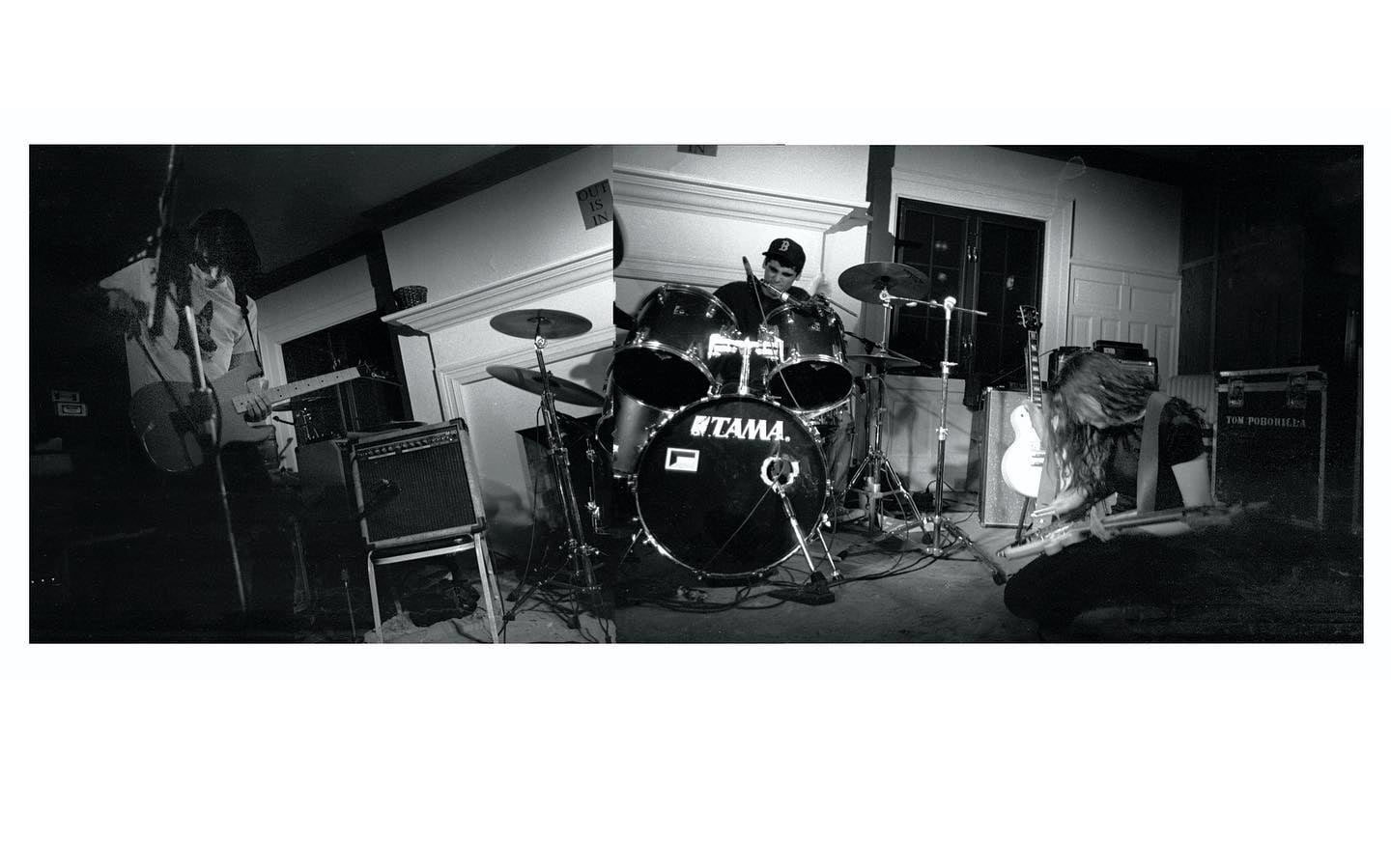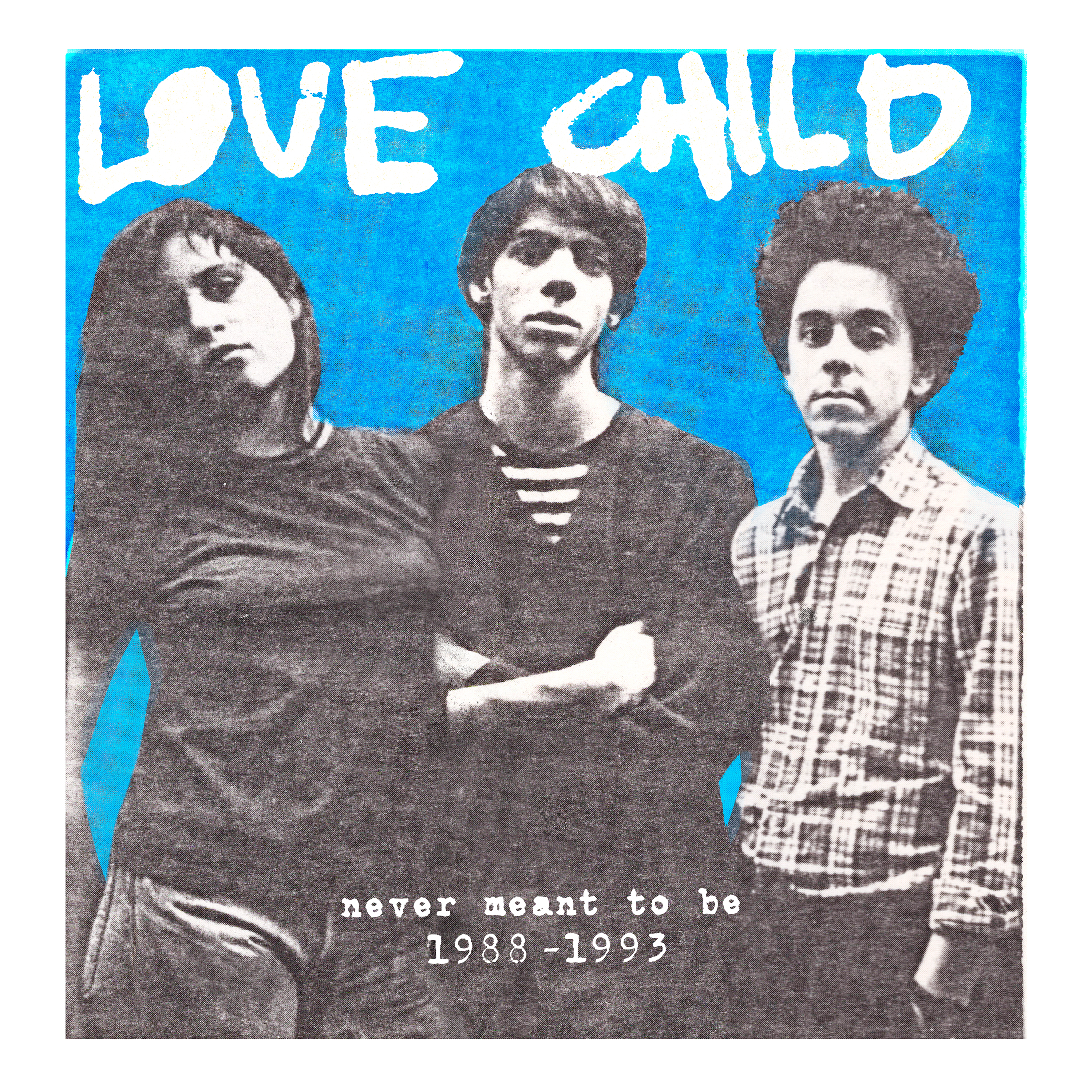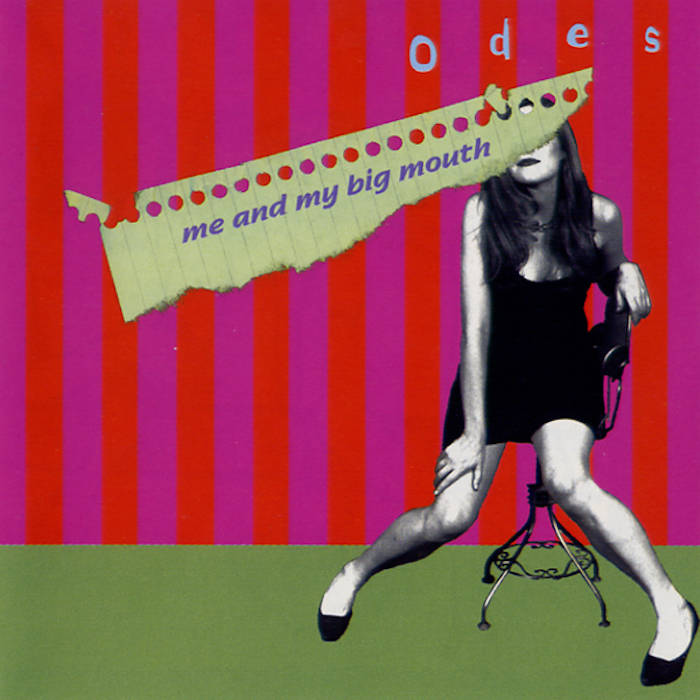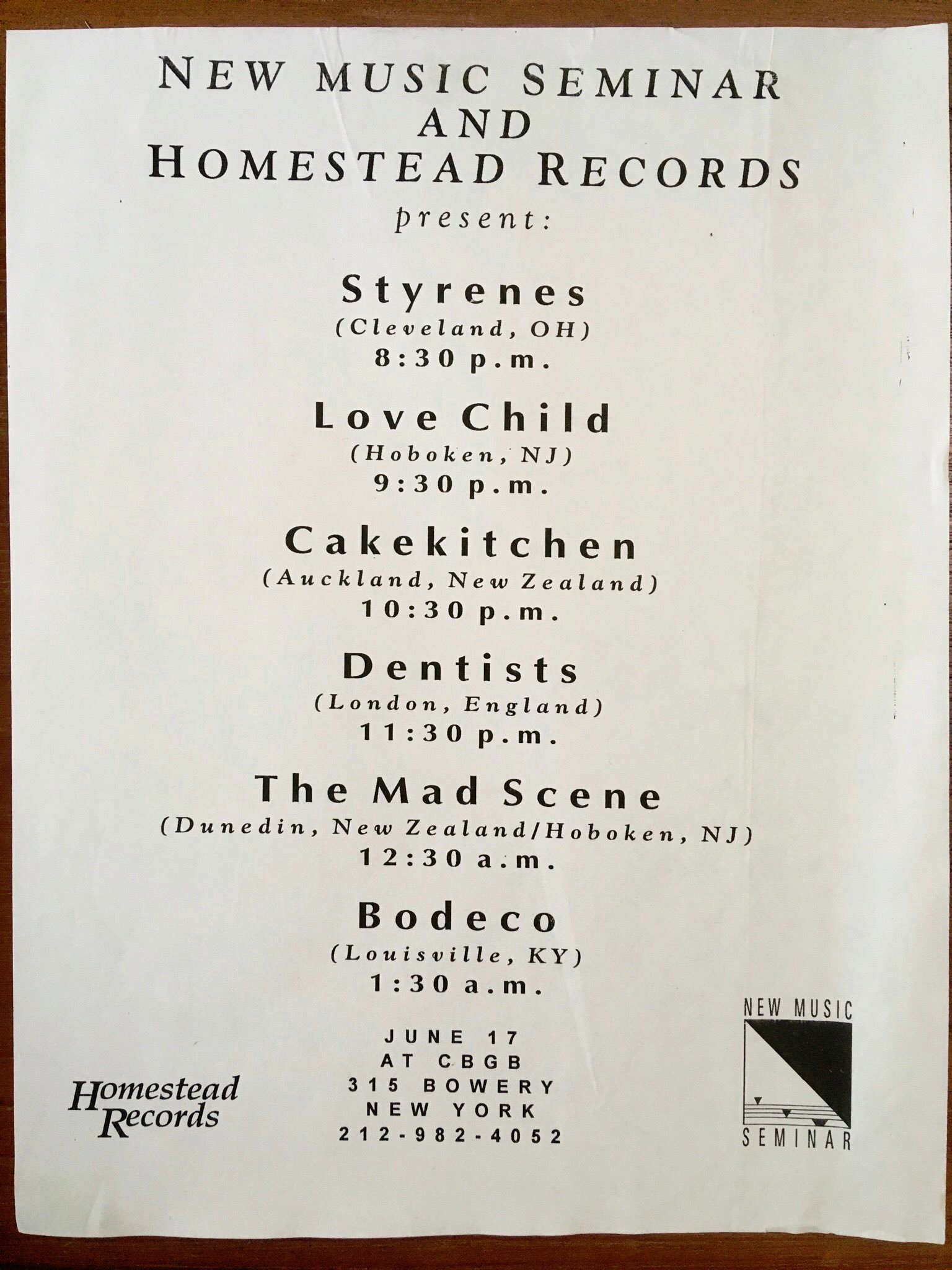
As unofficial documenters of the New York City independent music scene, we should have interviewed Rebecca Odes long ago. Back when we started our zine, she was playing in Love Child, a trio she joined while at Vassar with Alan Licht and Will Baum (and later Brendan O’Malley), along with her band Odes. In the decades since then, she has been a prolific media creator, writing books and creating outlets such as Gurl.com, Wifey.tv and CherryPicks (a feminist-slanted improvement on Rotten Tomatoes). She’s also a multimedia artist and a parent! To celebrate the release of a just-released Love Child compilation, Never Meant to Be: 1988–1993, on 12XU Records, Rebecca chatted with chickfactor about her background, the olden days, her present and other important issues. Listen to the compilation here. (Thanks to Michael Galinsky and Michael Macioce for sharing their photographs)
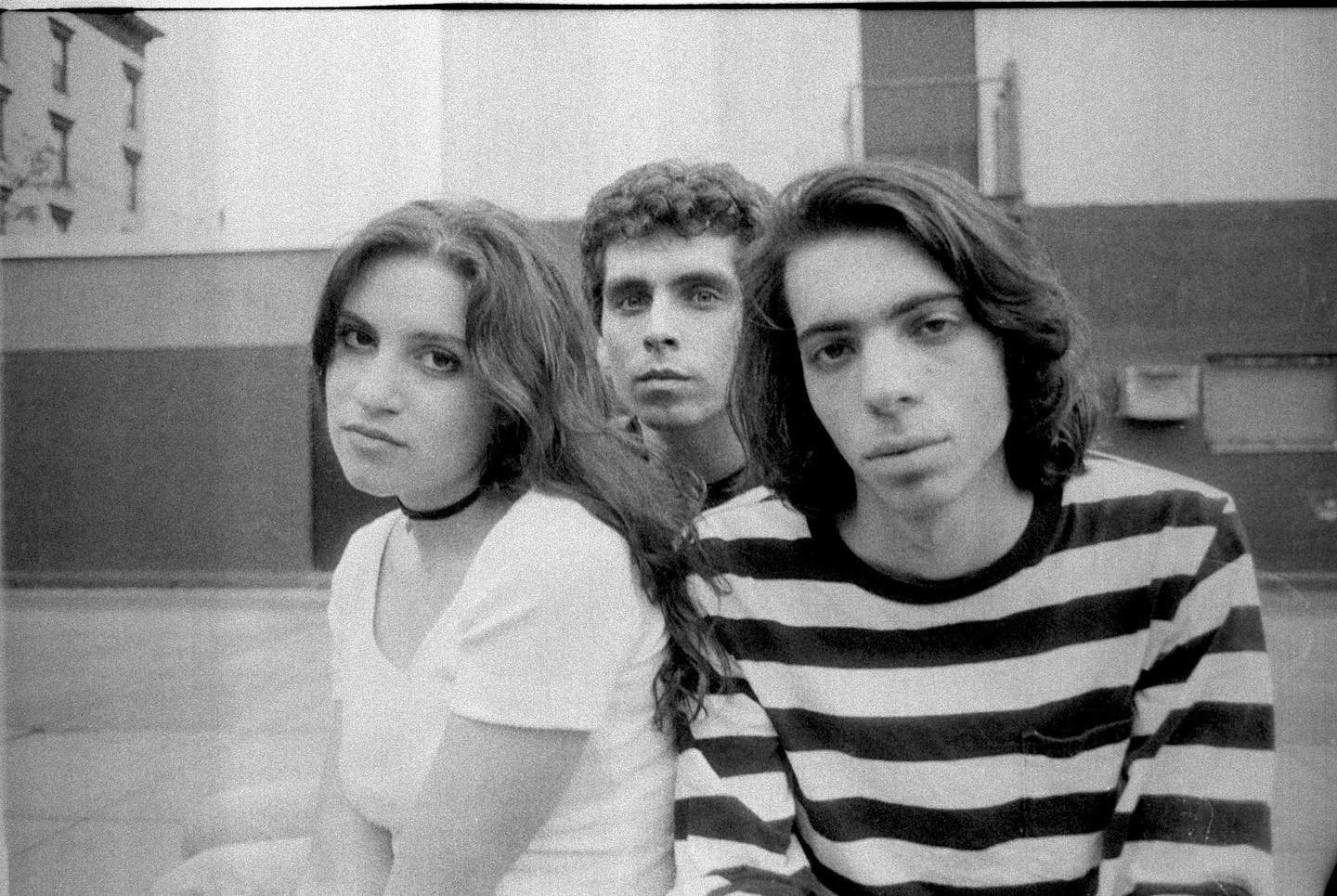
chickfactor: Tell us a bit about your background: Where did you grow up? Was your family into music? What were you like as a kid? A teen?
Rebecca Odes: I grew up in West Orange, New Jersey. I share an alma mater with Tony and Carmela Soprano. I was a dozen years later, but the vibe tracks. It was a sports and big hair situation. I was generally considered a weirdo, sensitive and not very socially adept. I wrote poems and made art and installations with my dolls.
My father was an incredible pianist—the lore was he could have gone to Juilliard but had to take over the family electrical supply business. I was not good at practicing, but I made up songs and conceptual rock bands. When I was 12 I went to an art camp, where I discovered most artists were weirdos. It saved me. The counselors were all the coolest people I had ever met. This may still be true. The theater director was Ondine from the Factory, though he used his real name there, and I didn’t discover this until I looked him up 20 years later. He wrote a musical version of The Lion, The Witch and the Wardrobe with James Irsay, a cult classical WBAI DJ. I was Susan, and sang the song they wrote for me on the roof of a building—kind of my first public performance. The art counselor was Michael Stipe’s roommate. She did my hair and makeup for a B-52s airband, which is how I learned I liked this particular way of being on stage. I learned to play bass there, the summer after my freshman year, when I was a counselor. My boyfriend was the guitar teacher; he got the camp to rent a bass which was ostensibly for the campers, but I’d take it back to my bunk every day and play along to ’60s pop songs. We formed a conceptual band called I AM A BUNNY. It was me playing the riff to “Li’l Bit o’ Soul,” a noise box, and my friend Max shrieking the lyrics to the Richard Scarry book. We played once.
How did Love Child come together and how long did it last?
A couple of months later, fall 1987, we were all back at Vassar for Sophomore year. I had seen Alan and Will around but hadn’t met them. Some mutual friends said they were starting a band and looking for a bass player. We got together to play and they decided I was a better bet than the guy they had been playing with. I had only been playing for six weeks, so it was a steep learning curve. We started playing at school fairly soon after that (see photo of our first show below) We were a band for the next fiveish years—until 1993, though there were two incarnations. Love Child was Will Baum’s brainchild—he had come up with the name and most of the songs played at the beginning. There was a lot of instrument-switching in that lineup; Alan would play drums on Will’s songs and they’d switch when Alan sang. Alan and I slowly started filling our songs around the edges, and then that coalesced into something that didn’t fit quite as well with what Will was doing. Will went away for a semester. Brendan O’Malley filled in while he was gone, and by the time he came back we had gelled into something different.

Any memorable stories about live shows, recording or touring?
We did a European tour with Codeine, which included what seemed like every single town in Germany and a few other places. I had a somewhat contrarian impulse to put Jaegermeister on our rider (I’d heard the Euro version had some kind of magical powers). This always struck people as gross because of its frat boy rep, but I realize now I was just an early Amaro adopter. Also maybe subconsciously trying to treat my nervous stomach? When we were first playing, I used to swig so much Pepto Bismol at shows, I kept a bottle on my amp.
Got any tour horror stories?
Once we played in Denver during a snowstorm. Someone came in and said a woman had been hit by a car outside. We never found out if she was okay. This kicked up some childhood car trauma which manifested in an unhealthy unlucky association with the lipstick I was wearing (MAC Viva Glam III), which, while not at all as sad as being hit by a car, is a little sad, because it’s a really good color.
What was the independent music scene like in NYC in the Love Child era?
I used to imagine the early ’90s NYC indie scene as a land of two kingdoms: Sonic Youth and Yo La Tengo. This was a made-up thing, obviously—those were not at all two sides, and they overlap in lots of ways. But it felt like there were two energies, warm and friendly, and cool and gritty. We were sort of straddling that, or maybe in many places at once, because we had so many different songs and sounds.
The scene was generally friendly and supportive all around—I don’t remember any real competitive energy. Inside CBs was the music, but the party was on the street. It definitely felt like a community, and there was a sense that we were sharing something not everyone got. I feel lucky to have been a part of it.
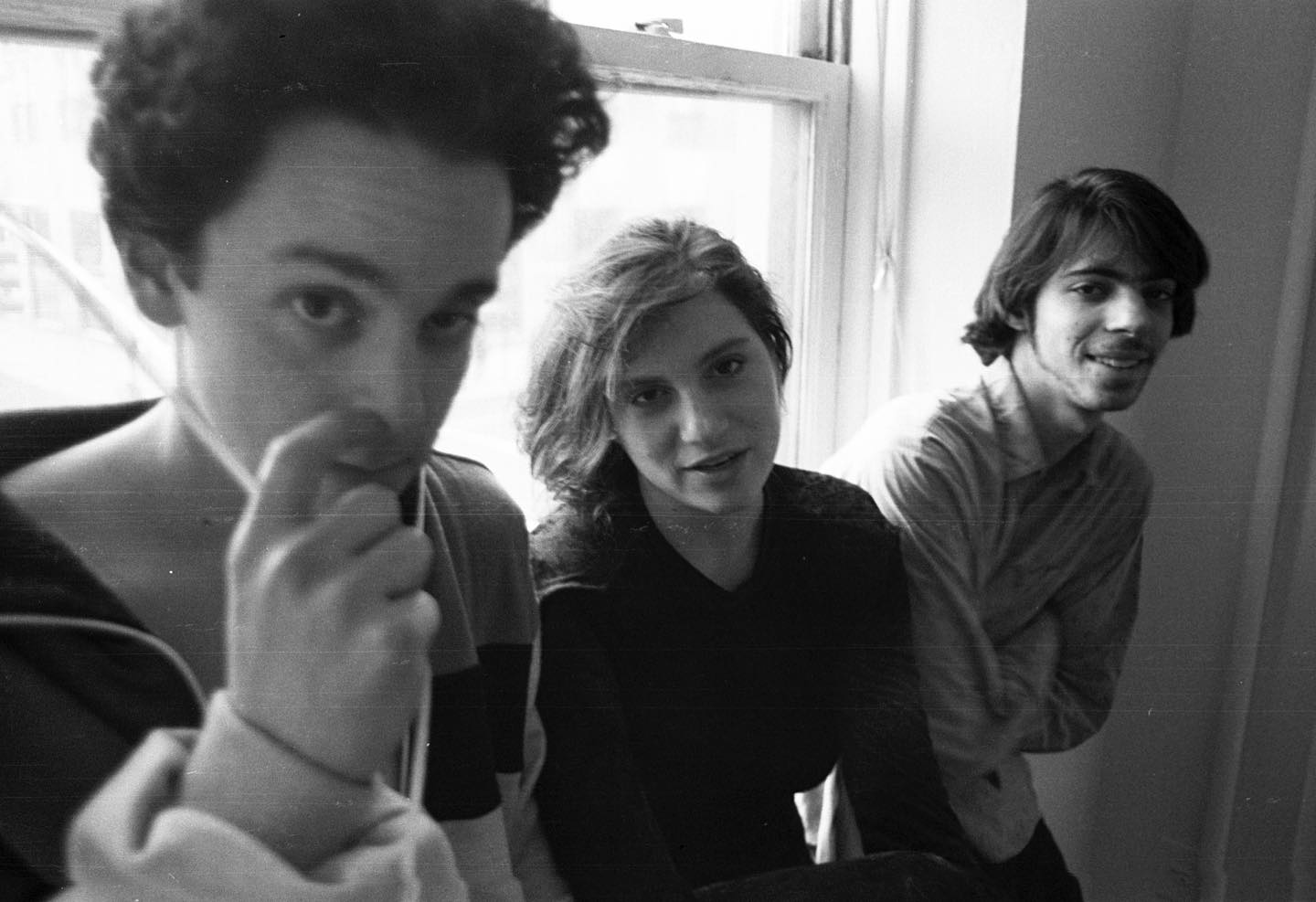
What was Love Child’s dynamic like?
Fraught, but fun. We got along pretty well personally; our sensibilities and senses of humor are very aligned. We were all into the same art, movies, obscure whatevers. There was a kind of built-in tension to having three different songwriters and styles. In the beginning, Alan and Will had a lot of knowledge and skills I didn’t have. I was learning on the fly—they were teaching me, really, with varying degrees of tolerance. Will had very strong ideas about how he wanted things to be. He was always trying to improve me, which I appreciated in theory but found annoyingly controlling in practice. He once insisted I learn the bass part of every song on Are You Experienced? in one afternoon, which may have stretched the boundaries of consent as well as the reach of my fret hand. I wrote “Willpower” as a sort of bratty reaction to that feeling. Alan was less bossy but sometimes more intimidating. It took me a long time to feel really confident in the shadow of his expertise. I had the feeling that my contribution was somehow less valid because it was less about musicianship. And there was definitely some weirdness about me being The Girl and the attention this brought.
By the second album, I was much more self-assured as a player and songwriter. But then there was a new problem: I got tinnitus. Noise was a really integral part of Alan’s guitar sound. We played loud, long noisy jams. I definitely clocked some hours on the floor with my ears close to the amp. I love noise, and have a real visceral craving for it, still. But my ears have always been sensitive, so I guess I should not have been surprised they were sensitive to damage. Volume became the subject of many fights (I remember one soundcheck in Rotterdam that got particularly ugly). This was a real factor in the band’s breakup. I think I was experiencing a kind of grief about the permanence of the injury, and it felt like the noise level had done the damage. But it was hard to imagine how this band could exist without it.
If you had a theme song, what would it be?
I feel like too many things to identify with one song, but I’ll go with “A Plan, Revised” by The Trypes.

What kind of bands did you play with then? What were you inspired by/listening to?
We played a lot with NYC bands: Yo La Tengo, Dust Devils, and Homestead bands like The Mad Scene and Truman’s Water. We often did shows with Antietam and Sleepyhead as we were buddies. We also played with Galaxie 500, Pavement, Sonic Youth and The Feelies in various capacities (recall being bummed that The Feelies were not at all as friendly as their music).
We were definitely nursing a Velvet Underground fixation, as well as early Modern Lovers, and drony noisy stuff like Stooges and Spacemen 3. I am also drawn to minimalist music, maybe for therapeutic reasons. But I have always loved a good sing-song situation. I listened to a lot of Shangri-Las, and then some of the bands that took some of that sound/vibe and ran with it. Young Marble Giants were a huge favorite. We were going to record a song for the YMG tribute in the early ’90s, but that fell apart for some reason.
Did you experience a lot of sexism or misogyny back then? Nasty soundmen? Stories please.
I’ve been hung up for a long time on how to answer this question. I had some profoundly disturbing experiences during this time. Yeah, there were nasty soundmen, though to be honest, mixing a loud band with a not-so-loud voice is a recipe for frustration on all sides.
The more meaningful stuff was elsewhere in the scene. There was a kind of reverence for transgression and a lack of boundaries around substances and sexuality, which felt cool and empowering…until it didn’t. I was very trusting and game. I accepted that being willing to be packaged sexually was part of “the business,” that being packaged sexually came with being perceived sexually, and that it was up to me to figure out how to manage the results of this perception. I understood this as part of being transgressive, which I was very interested in, in theory. In practice, this did not always work out well for me.

We had some major label interest for a second. The guy took us out to a fancy dinner, and asked us if we were “willing to do what it takes.” I thought about that whenever something happened that felt wrong. There was a very explicit Lolita thing happening in Europe (see clip below.) This was very confusing to me—I mean, Christiane F was a cool movie, but being identified with a 12-year-old girl who turned to sex work to support her heroin addiction felt super gross. There was also press playing on this teen thing, a lot of it entirely made up (even the supposed direct quotes). There were some pretty terrible interactions with men around this, on many levels.
If I were doing it again, I would have approached some things differently. I think it helps to keep some distance when you’re putting yourself out there. I was not doing that, and it made me really vulnerable. I wish I could say I would be more confident and push back when things felt weird. But while I was not at all a teenager, I was still young enough to think these people knew better—there was a part of me that believed this was how it all worked.
Tell us about the new collection: What’s on it? How did it come together?
Never Meant To Be is a double album anthology. It’s a lot of the stuff we’re proudest of, all of which hasn’t been officially available online, and some of which has never been available anywhere. There are two songs from our Peel Session, which was never released—“Greedy,” which was the last song we wrote together, and a version of “Asking For It,” the first song I ever wrote (as a too-late act of self-defense against harassment, street and otherwise). Also “Erotomania,” which was on a Spanish compilation 7-inch called THIS IS ART (Love Child, Yo La Tengo, Cell, Vineland), and some stuff from live radio shows, as well as our picks from our various releases. We’ve been talking about doing this for a while, and were really happy when Gerard wanted to put it out.
What other bands/projects have you been in then and now?
After Love Child broke up, I started a band called Odes. I was excited about the idea of liberating my songs from the tyranny of two-minute guitar solos. I also wanted to play with some people who weren’t guys. Brendan had a friend named Ari Vena who played guitar. Jesse Hartman played bass at first (I had played bass in his band, Sammy, briefly). When he left, Ari suggested her friend John Gold. John had played in 9-Iron, Will Baum’s post-Love Child band. We put out a single and an EP on Merge.
I took a long break from music while breeding, etc. The idea of getting on stage and singing to people seemed absurd to me. Then it came roaring back in a new form—I didn’t want to be on stage or communicate anything—I just wanted to be near the noise. Ma’am was formed in 2010, with Charlie Gansa from Guv’ner, and Lyle Hysen, who had produced the second Love Child album (and played in Das Damen, among other bands). The name was kind of a perfect intersection of all our prior bands, post-child, female, apostrophe. We played together for a few years and actually recorded a handful of songs—a few are up on Soundcloud. I really loved that project—I was sad when it got waylaid by grown-up stuff.
Are you doing music now?
During the pandemic I re-upped my love of drone music and put together a long-distance noise collaboration with Alan, Gretchen Gonzales, and the guys from Wolf Eyes. Warren Defever (His Name Is Alive) produced it and it turned into Threshing Floor—I also made a video piece to accompany the release.

I know you are a visual artist as well; have you done that your whole life?
It’s taken me a while to realize what I really am is a multidisciplinary (sometimes interdisciplinary) artist. For a long time I saw different media as evidence that I was unfocused. And having many ways of working can definitely affect momentum, which can be frustrating. But I have come to see that this is just how my brain works. There are thematic threads that weave through and across the projects and media. My web projects, like gurl.com and wifey.tv, were coming from the same place that inspired the songs I wrote for Love Child, just approaching from a different angle in a different format. My paintings are exploring a lot of the same stuff as well, just visually.
What else are you up to these days? Jobs, kids, pets, hobbies?
Since co-founding gurl.com in the ’90s, I’ve been working on various media projects—From the Hips!, a pregnancy/birth/parenting book, Wifey.TV (with Joey Soloway pre-Transparent) and CherryPicks, which is still going strong, though I’m not in it day-to-day at this point. I have some other book projects brewing, and am also really trying to return to making art as much as I can. I am really painting again for the first time in many years, and doing new kinds of work as well: constructions that meld different media—painting, video, sculpture, light. Feeling really liberated about the possibilities of combination vs. choice. Also, rediscovering knitting, which makes me so much more tolerant of things I might otherwise find annoying or boring.
Are your kids into music? What do they like?
I was always told that kids rebel against their parents’ tastes, so I was prepared for that. But it hasn’t happened (yet?). My kids are about the same age I was when I was in Love Child, so we’re probably past the rebellion phase. From the beginning they’ve been pretty aligned. When they were little, we lived near Other Music, and I let them each choose an album there before it closed. My daughter got Revolution Girl Style Now. My son got Pink Moon. He plays Thurston Moore and Yo La Tengo on his college radio show. They both love Horsegirl. My daughter is into early Girlpool, Adrienne Lenker (and Taylor Swift, obviously). They both play guitar and write songs too, though haven’t done much of it in public since their own art camp experiences.

What are you watching, reading, listening to?
I don’t watch a lot of TV, mostly because I don’t think of it until I’m already too tired to get into anything.
I just saw Problemista, which I loved, and finally watched Kelly Reichardt’s Showing Up, which really got under my skin. I loved how she got at both the boring and shitty parts of being an artist (and a person) and the beauty and drive that compels.
I am trying really hard to get back into reading books, though I have a much easier time listening to them lately.
I just happened upon Brother of the More Famous Jack, a very fun ’80s coming of age book which was apparently well-loved in the UK but was only recently released in the US, thanks to Maria Semple, who found it in a bin somewhere. Tip: don’t read her intro. For some inexplicable (IMO inexcusable) reason, she gives away the plot.
I also love Dora: A Headcase, Lidia Yuknavitch’s punk feminist reframe of Freud’s case study. It is twisted, but incredibly compelling.
Music-wise, I’ve been leaning into my repressed dance impulses—I’m a little obsessed with Dembow. I have been doing this thing called Dance Walk, where we walk the loop in Prospect Park on weekend mornings, each listening to our own playlists on headphones. It’s kind of a crazy experience, being in your own sound world while everyone gawks at the parade of weirdos. It’s a real challenge to the impulse to feel cool and avoid being seen as a dork. But by the end of my first Ioop I was wondering why it’s so normal for everyone to work out by running in the same straight line.
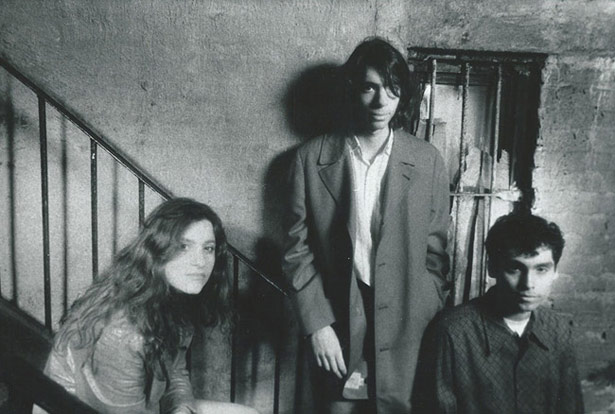
How do you find out about music these days?
I admit I’ve learned about a lot of cool shit from the algorithms. But I still prefer human curators. I am fortunate to have a partner who is a voracious music seeker, which inspires me to always go looking for new things to share. Many of my friends and people I am in touch with online are effusive about their musical findings. I’m part of a facebook group called “Now Playing” where people post LPs they’re spinning, and it’s a gold mine. Mikael Jorgensen runs a cool listening club in Ojai where people play songs they love, and everyone sits and listens like it’s church. I have definitely found some new favorites there.
Where are you living? How has NYC changed over the years?
I’m mostly in Brooklyn, and sometimes in Ojai, CA. I have been in Brooklyn for about three years. I was in various parts of downtown Manhattan before that, and after growing up dreaming of living in the center of everything, I was very hesitant to leave. But now I feel like an idiot. I like Brooklyn so much better! New York is always changing. The cost of living is insane. It does feel like the creative energy is being pushed out, or into small pockets. But it also feels like there is some fun, loose, cool stuff happening. I don’t know if this is new or reborn, or if I just wasn’t paying enough attention before. But things like the Every Woman Biennial, which I have a piece in right now, give me hope for the continuing mulch of the city for art and creative growth.
The ecosystem in terms of making money (if not a living) from music has changed; I remember seeing Love Child at the Terrace Club at Princeton, and those gigs paid pretty well. What can fans do to make sure bands get paid better? How would you change the system?
The whole system is pretty flummoxing to me at this point. I do not know why this world rewards the things it does and ignores so much of what is fundamental to human okayness. I do not know how we change this in a world that seems only interested in siphoning dollars to the top. I think the Living Wage for Musicians Act is a good start. Ideally I would like to see UBI for artists (and others). Art—of all kinds—is not bonus content to human existence. It is a necessity that is becoming increasingly hard to make. If I were changing the system, I would also do something about the fact that being an artist at this point is 10% inspiration and 90% social media promotion. Obviously, it has ever been thus—the thing itself a relatively small portion of the work. But I don’t know if there’s ever been a time when artists have been asked to continually produce public-facing material apart from their actual work. My public-facing brain is very separate from my creating brain, and I find switching back and forth to be really distracting and not very creatively constructive. I would love to see artists have more time to make art, period.
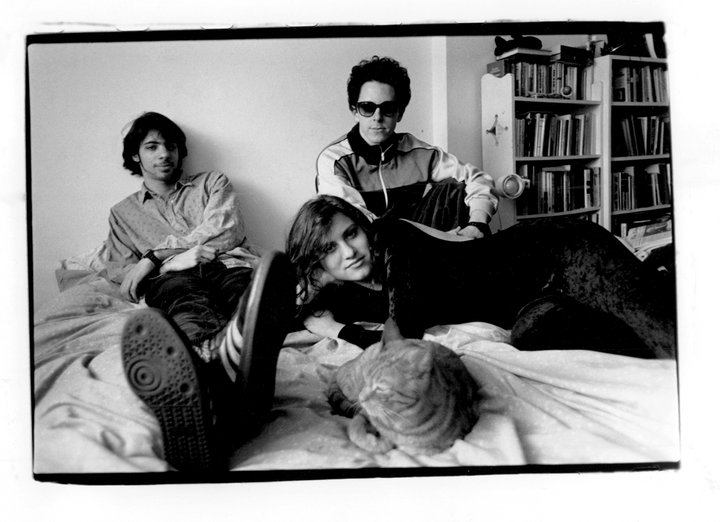
The folding of media outlets like Pitchfork (well, kind of) mean that there are even fewer gatekeepers controlling what music gets attention. What music do you adore that has been ignored by gatekeepers?
I’ve mostly been ignoring the gatekeepers. Is that how people find out about things now? I am not sure my kids have ever read a music magazine. I think they find everything on streaming or social. The stuff I love has always been sort of marginal- though obviously so much of what was marginal isn’t anymore. I’ve been listening to a lot of Zamrock and Krautrock, and Krautrock-adjacent stuff, like Slapp Happy. I would love to see The Shams (Sue Garner, Amy Rigby, Amanda Uprichard) back on the map. I can still sing those songs by heart even though I haven’t heard them since my cassette went missing in the ’90s.
Let’s talk about ageism. Some people are shocked that Kim Gordon could be 70 and also cool and modern, but there are loads of older people doing creative things (Yoko Ono, Bridget St John, ESG, etc.) Why is there an assumption that people stop doing things as they age? How have you experienced ageism, if you have? How can we as a culture stop allowing it to be normalized?
This is something I’ve been writing about and working through over the past few years. Ageism is pretty ubiquitous. People don’t even feel like it’s something they need to feel bad about.
This is a generalization, but it’s often the way it goes: Women spend half their youth navigating sexual attention or worrying they’re not good enough to earn it, then spend half their adult lives taking care of people. When they finally have time and confidence, people say they’re past their prime. It’s just another tool to try to get them out of the way.
On a larger scale, I don’t think there’s a lot of incentive to stop seeing older women as useless. Centering women’s power on sex and reproduction serves a lot of purposes. It keeps them busy and makes them buy things. To decide to value women outside of this swath would require knocking the whole thing down, recognizing power that’s lived instead of bought and worn like a mask. I am not super hopeful about dismantling the locked arms of patriarchy and capitalism anytime soon (though hey, there’s always the apocalypse) so it’s on us to redefine the way we see ourselves. Maybe this will lead to people seeing us differently. Maybe it won’t. Either way, it’s the best shot at an unshitty unyoung life.
I think the best way to deal is to just say fuck it. Enough already. I want to see a million old lady punk bands.
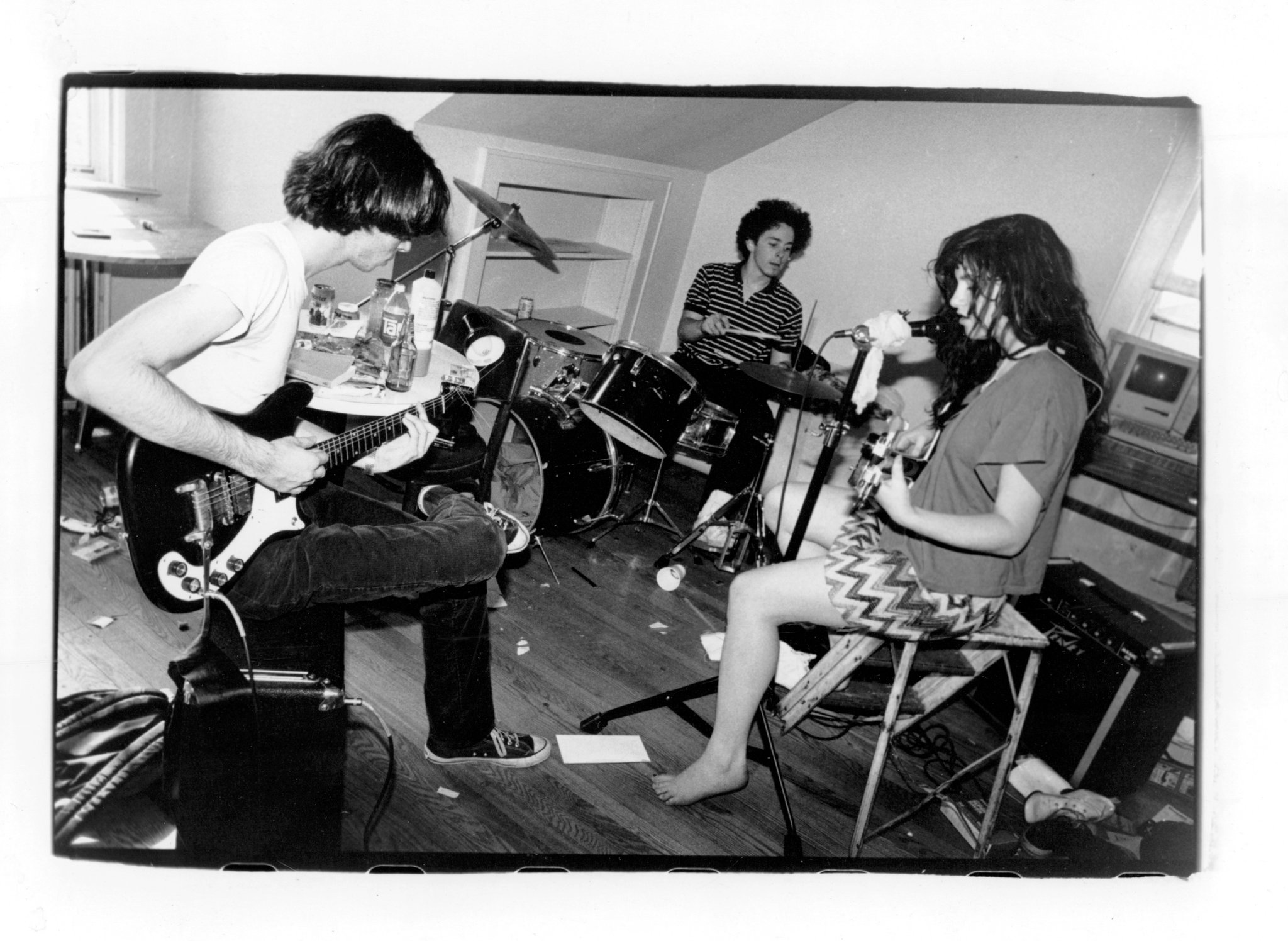
Can you cook? What’s your specialty?
I grew up cooking. My ex had some professional cooking experience and was great at it, so I detoured into desserts and drinks. I didn’t have the time or focus to make much art when my kids were little, and baking became a medium. I made elaborate pies, cakes, cupcakes, curds, and brulees. Part of my adjustment to single momhood was reconnecting with my savory skills. I am partial to stewy braisy things that don’t require me to pay attention to them. I still love baking, though since I am usually making other food as well. I am more inclined to make simple things like galettes or granola. I definitely like to go all out sometimes, though. I have a book club where we try to cook thematically. When we read Gertrude and Alice, I cooked from the Alice B. Toklas cookbook—aspic was involved. It was a lot. But I do enjoy a high-concept project.
What’s in your fridge?
Many therapeutic beverages that promise and do not deliver. Also many condiments. Coriander chutney, harissa, various hot sauces. Goat Kefir. Lacto fermented ginger carrots. Multicolored produce: fennel, lacinato kale, arugula, cilantro, parsley, chioggia beets, watermelon radishes, purple Japanese turnips, blueberries. These may or may not be rotting. I am a newish and very enthusiastic member of the Park Slope Food Coop, and sometimes fail to deliver on my shopped promises.
What’s making you really happy these days?
–Color. Especially pink. Extra-especially fluorescent pink. I have a persistent obsession with pink plexiglass. I thought this was new wave damage but my daughter has it too, so it might be genetic. Or maybe just human. I have a theory about this color and why we love it so much. We think of it as so unnatural, but it’s the exact color of light when you look at it through your fingers.
–Pipilotti Rist installations. I might live in one if I could.
-Flâneuring. I’ve been able to travel a bit again for the first time in a while, and it is so good to get this part of myself out of hiding.
What makes you really mad?
I am trying to get less mad, at least at things that don’t matter. But a lot of things do matter a lot and it is hard for me to compartmentalize. I can easily get upset enough to cause major interference. I try to be sparing with social media to not feed the beast.
If you were president, what would you do differently?
I should never be president. I have the wrong disposition. I am horrified by everything that is happening and have no answers.
What are you looking forward to this year? How do we stay sane in this election year?
I am eager to get on stage for sure. Alan and I played a noise show in February which was super fun, but made me want to do more, and sing some songs.
I am definitely not looking forward to the election. We are going to need some boundaries. Also reminders that the story we’re hearing is a narrative intended to freak us out. Which doesn’t mean it isn’t real. But it’s being told in the most outrage-inducing way so we are compelled to watch/read/click/give/vote. Some of those things are more important than others.
Will Love Child be playing shows?
We’re playing at Union Pool on June 9!!
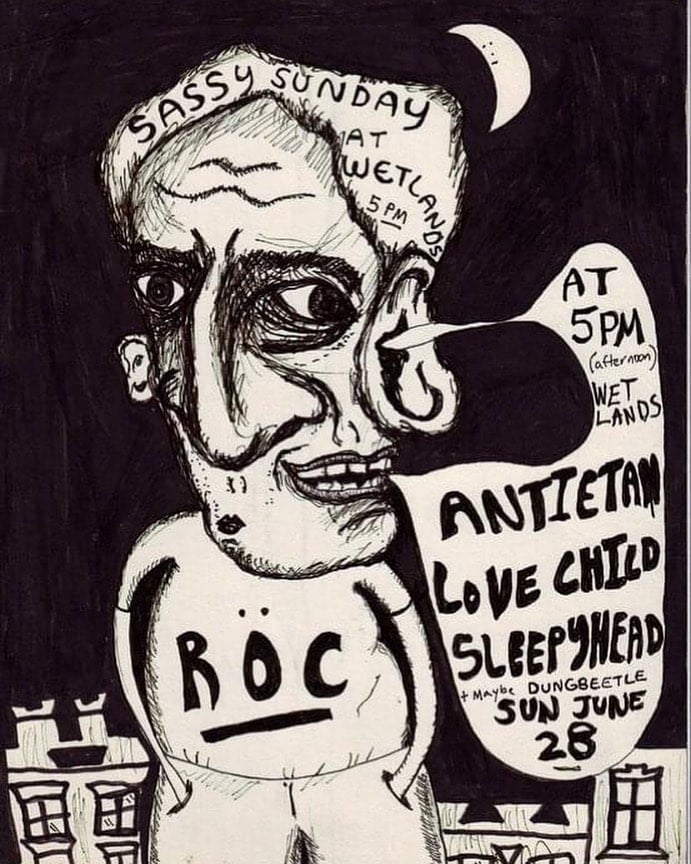
Records Rebecca Cannot Live Without
BRIAN ENO Here Come the Warm Jets
FAUST Rainy Day Sunshine Girl
CAN You Doo Right
THE BEATLES It’s All Too Much
DUMP Superpowerless
SONIC YOUTH Starpower
VELVET UNDERGROUND Heroin
RICHARD AND LINDA THOMPSON I Want To See the Bright Lights Tonight FAIRPORT CONVENTION Tale in Hard Time
LEONARD COHEN Famous Blue Raincoat
IRON AND WINE Upward Over the Mountain
SPACEMEN 3 Honey (Forced Exposure Single Version)
YOUNG MARBLE GIANTS Salad Days
TALL DWARFS Think Small
THE TRYPES A Plan Revised
